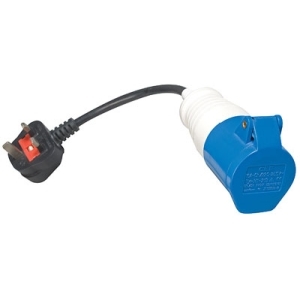Hi everyone...
What electrical testing (if any) need to be done WITHIN a caravan
Section 721 covers caravans But, I cant find anything saying that the internal installation needs to be tested
Anyone any ideas??
Mobile travelling caravans are subject to much bumping up and down and vibration so need thorough regular testing. Flexible cables are best rather than sold conductors for these, and double pole M.C.B.s. 721.43.1.
I do work in static caravans on sites where the caravans never move. They have, or had, wheels but really are a small home. Any external cables can be damaged by mice, rats or squirrels and can be dangerous. The supply R.C.D. and internal R.C.D. should be carefully tested as the caravans are to be TT earthed and rely upon the R.C.D.s
Recently I inspected a static caravan prior to doing some work. The supply was from a small brick built supply building. It supplied three static caravans. The three were protected initially by a single 300mA S type R.C.D. Then the three caravans each had 30mA R.C.D.s and a B40 M.C.B. for each hook up point. When I took the cover off the consumer unit inside the caravan it was supplied in 1.5 3 core flex which ran down to a blue 16 Amp caravan plug under the caravan. As the heating and cooking are mainly by gas there have so far been no overloading problems, but new electric heaters will require the upgrading of the supply cable from the 1.5mm2 3 core flex. Incidentally the consumer unit contained a B32 M.C.B. for the ring final circuit. But most sites restrict the supply to 16 Amps. maximum for each caravan. (708.55.1.5.) but B.S. 7671 states this as being a bare minimum rating.
The site supply has not been maintained or tested for many years, and some metal enclosures in the supply building have rusted so much that a finger can be poked inside them. So they may be 20 years or more old.
I doubt that the brick building R.C.D.s have been tested at all in many years.
721.411.3.1.2 requires structural conductive parts which are accessible from within the caravan or motor home to be bonded to the caravan's main earthing terminal. I take issue with this, especially where motor homes are used and may be supplied by a P.M.E. supply at anytime, such as on a house drive etc.

Z.
Mobile travelling caravans are subject to much bumping up and down and vibration so need thorough regular testing. Flexible cables are best rather than sold conductors for these, and double pole M.C.B.s. 721.43.1.
I do work in static caravans on sites where the caravans never move. They have, or had, wheels but really are a small home. Any external cables can be damaged by mice, rats or squirrels and can be dangerous. The supply R.C.D. and internal R.C.D. should be carefully tested as the caravans are to be TT earthed and rely upon the R.C.D.s
Recently I inspected a static caravan prior to doing some work. The supply was from a small brick built supply building. It supplied three static caravans. The three were protected initially by a single 300mA S type R.C.D. Then the three caravans each had 30mA R.C.D.s and a B40 M.C.B. for each hook up point. When I took the cover off the consumer unit inside the caravan it was supplied in 1.5 3 core flex which ran down to a blue 16 Amp caravan plug under the caravan. As the heating and cooking are mainly by gas there have so far been no overloading problems, but new electric heaters will require the upgrading of the supply cable from the 1.5mm2 3 core flex. Incidentally the consumer unit contained a B32 M.C.B. for the ring final circuit. But most sites restrict the supply to 16 Amps. maximum for each caravan. (708.55.1.5.) but B.S. 7671 states this as being a bare minimum rating.
The site supply has not been maintained or tested for many years, and some metal enclosures in the supply building have rusted so much that a finger can be poked inside them. So they may be 20 years or more old.
I doubt that the brick building R.C.D.s have been tested at all in many years.
721.411.3.1.2 requires structural conductive parts which are accessible from within the caravan or motor home to be bonded to the caravan's main earthing terminal. I take issue with this, especially where motor homes are used and may be supplied by a P.M.E. supply at anytime, such as on a house drive etc.

Z.
We're about to take you to the IET registration website. Don't worry though, you'll be sent straight back to the community after completing the registration.
Continue to the IET registration site